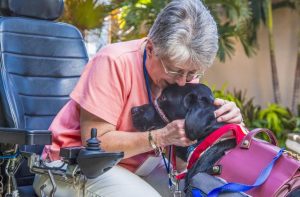A helping paw
April 1, 2020

The health care needs of each person are multifaceted, consisting of various factors that makes everyone unique.
Therefore, effective health care requires collaboration between various professionals to support healthy and meaningful lives. We celebrate April as National Occupational Therapy Month. Occupational therapists (OTs) play an important role across the lifespan in a child’s development or an individual’s recovery and integration into society after a life changing incident. Occupations are everyday life activities, from brushing our teeth to navigating the SunRail after work. OTs work closely with clients to provide individualized skilled services, empowering individuals to feel confident participating in everyday activities. Various interventions are associated with this profession, including those cute animals in vests you may have seen around.
What’s in a name?
The terms service animals, emotional support animals (ESAs), and therapy dogs are frequently seen as interchangeable. However, these animals have different training, rights and roles. Service animals are specifically trained to work with individuals with disabilities, aiding with tasks directly related to the disability— picking up a dropped item for an individual with Parkinson’s Disease, alerting an individual with hearing impairments when someone is at the door, guiding an individual with low vision across the crosswalk, and even detecting changes in blood sugar for those with diabetes. Service animals are covered under Title II and III of the Americans with Disabilities Act (ADA), meaning they are allowed in every public setting to assist the individual with the disability. However, under the ADA, only dogs can be considered service animals. Conversely, ESAs and therapy dogs are not covered under the ADA. They are not necessarily afforded the same rights to access in public facilities, but can still play a crucial role in providing emotional support and alleviating stress or anxiety. Nevertheless, they do not require any specific training. Unlike service animals, ESAs include a wide array of unique animals, such as birds, rabbits and turtles. Technically, any animal can be considered an ESA, but they require a letter from a licensed health-care professional confirming the individual has a disability and that the ESA would be beneficial for their disability. Therapy dogs, on the other hand, require more training to interact with a variety of people. Therapy dogs are certified as they often travel to places such as hospitals, libraries, and schools to provide emotional support. OTs can play a special role in integrating therapy dogs into their practice with animal-assisted therapy. OTs can also assist individuals with disabilities on how to care for their service animal and incorporate them into their daily routines.
Rights for individuals with service animals
According to the ADA (2010), service animals are permitted in all public locations, including businesses, restaurants, government agencies and schools. However, service animals must be under a leash or otherwise controlled. If needed, businesses can ask if the animal is a service animal due to a disability and what type of trained tasks the animal does. However, businesses are not legally allowed to ask for any form of documentation, nor are they allowed to probe about an individual’s disability. Furthermore, individuals with service animals can only be legally asked to leave if the service animal is not under their control. Individuals with disabilities who own service animals must be treated equally and given the same level of service as any other individual. Staff members are not required to attend to the animal in any way.
Etiquette – To pet or not to pet?
As tempting as it may be to pet these animals when you see them in public, it is important to remember that they are performing essential jobs for their owners and not to distract them. Avoid talking, feeding, or petting animals without asking for consent from their owner. Despite whether the animal walks up to you or not, it is imperative you speak directly to the handler and ask for permission first. These animals typically wear vests, reminding others not to pet or touch them. Remember, individuals with service animals utilize them to manage a health condition; they may not want to draw public attention. Therefore, weigh whether it is worth speaking to the owner or appreciate the animal’s service from afar.
This article was a collaboration by some of the Master of Occupational Therapy students at AdventHealth University; Brielle Coleman, Annabel Dinh, Heather Priore and Angela Sy.













